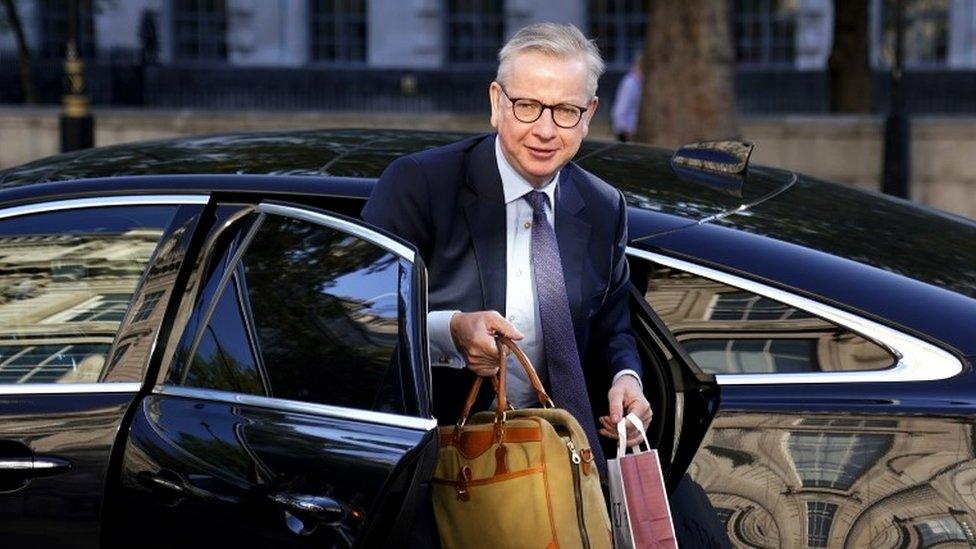Brexit: Arlene Foster says NI is not EU's plaything
- Published
- comments
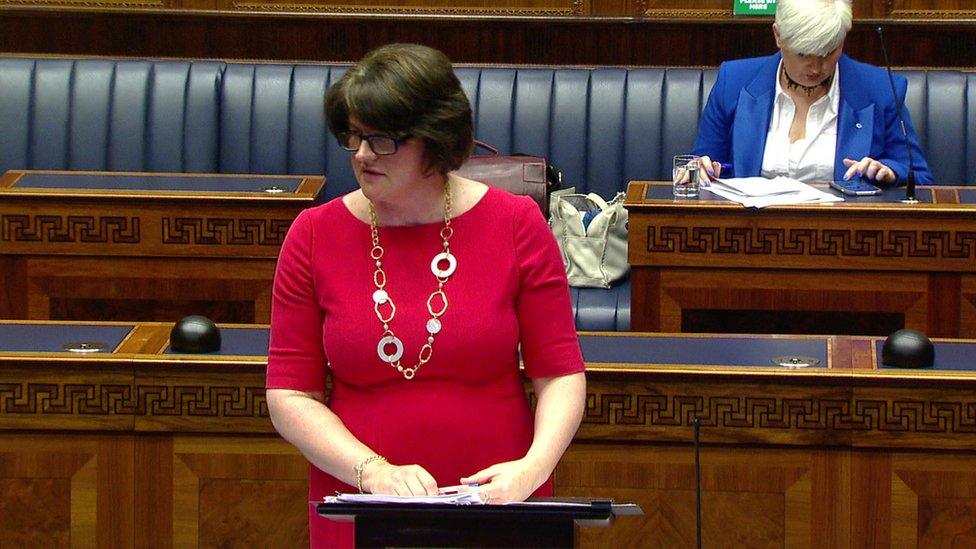
Arlene Foster said she was frustrated at attempts by the EU to use NI for political gain
The EU "needs to stop using Northern Ireland to get their own way", NI's First Minister Arlene Foster has said.
She was speaking at Stormont ahead of MPs at Westminster voting on a bill that would override part of the Brexit deal relating to Northern Ireland.
The Internal Market Bill passed its second reading by 340 votes to 263 - a government majority of 77.
The DUP backed the bill, but the SDLP and Alliance and other opposition parties voted against it.
The EU said if Parliament passes the legislation, it will be difficult for trade deal negotiations to continue.
It has insisted the NI Protocol, signed last year to avoid a hard border in Ireland, must be implemented in full.
Downing Street has said the Internal Market Bill is a safety net, in case talks to work out details of the NI Protocol fail - but has admitted implementing it will break international law.
Some unionist parties gave it a broad welcome, saying the EU cannot be allowed to impose an economic border between Northern Ireland and the rest of the UK.
The Ulster Unionists do not support the protocol, but said the government should not be threatening to break international law to "right a terrible wrong".
Sinn Féin, the SDLP, Alliance and the Greens have criticised the British government for reneging on previous commitments and argue that overriding the NI Protocol would "critically undermine the Good Friday Agreement political framework and peace process".
'UK market must be protected'
Mrs Foster, whose party the DUP has said it will support the government's bill, said Northern Ireland was "not the plaything of the EU".
"The EU needs to stop using Northern Ireland to get their own way," she told assembly members at Stormont on Monday.
The party's chief whip in Westminster, Sammy Wilson, said the bill was a massive step forward for business in Northern Ireland - but "not the finished product".
Speaking in the Commons, he said if the bill was an attempt to try and "undo some of the damage done by the withdrawal agreement", then his party would support its passage.
"The warnings this party gave about the deal are now coming home to the government and they are beginning to realise the impact it had," he added.
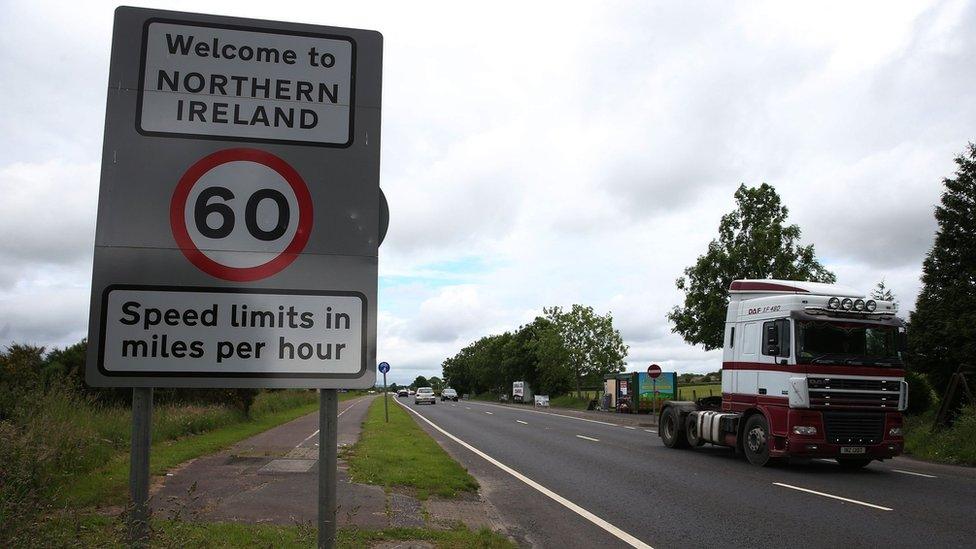
The bill would give UK ministers the power to reduce the amount of paperwork that Northern Ireland firms have to fill in on goods bound for Great Britain, such as export and exit declarations, or to remove the need for them entirely.
It would also allow the UK to narrow the scope of EU state aid rules in Northern Ireland.
It is controversial because it would change the terms of the Northern Ireland Protocol, a crucial part of the legally-binding Withdrawal Agreement agreed by both sides prior to the UK's exit from the EU.
During the Commons debate, Mr Wilson also claimed that his colleague, Stormont's Agriculture Minister Edwin Poots, was "overruled" by Westminster on the issue of facilities at ports for Brexit-related checks.
He said Westminster Environment Secretary George Eustice had "instructed civil servants in NI to put up border posts and proposals for them", despite all of the details not being agreed.
It comes after BBC News NI reported that Stormont ministers clashed over a proposal from Mr Poots to halt work on the facilities, because of the Internal Market Bill.
Sinn Féin, the SDLP and the Alliance Party argued that proceeding with work on the controls is required to fulfil the executive's international obligations.
Stormont's Department of Agriculture, Environment and Rural Affairs has been approached for comment.


The government's contentious legislation has passed its first hurdle - but Boris Johnson still came under pressure to defend it in the Commons.
The prime minister insists the bill is an insurance policy, in the event talks with the EU on the Northern Ireland Protocol don't go well.
Not everyone is persuaded by that argument.
Although he won the support of the DUP who oppose the protocol entirely - the SDLP and Alliance, along with other opposition parties, said Boris Johnson could not be trusted.
Brexit continues to divide as does the government's way of delivering it.
Many more days of debate will now follow, as Number 10 attempts to fast-track its latest plan into law.

What is the Northern Ireland Protocol?
The Northern Ireland Protocol is designed to prevent a hard border in Ireland - or even any new checks at the Irish border.
It does this by effectively keeping Northern Ireland in the EU's single market for goods.
This will mean products entering Northern Ireland from the rest of the UK will be subject to new checks and control - the so-called Irish Sea border.
However, the precise nature of these checks needs to be agreed by the EU and UK and are being negotiated in parallel with the trade talks, which Prime Minister Boris Johnson wants concluded by the next European Council meeting on 15 October.
It will also mean when relevant EU laws are amended or new ones are drawn up, they will also apply in Northern Ireland.

PM 'cannot be trusted'
Downing Street wants to fast-track the bill's passage through Parliament, but the SDLP has joined other opposition parties to try and stall it.
SDLP leader and Foyle MP Colum Eastwood told the Commons that without the NI Protocol, the only thing people were being offered was "the word of a man who clearly cannot be trusted".
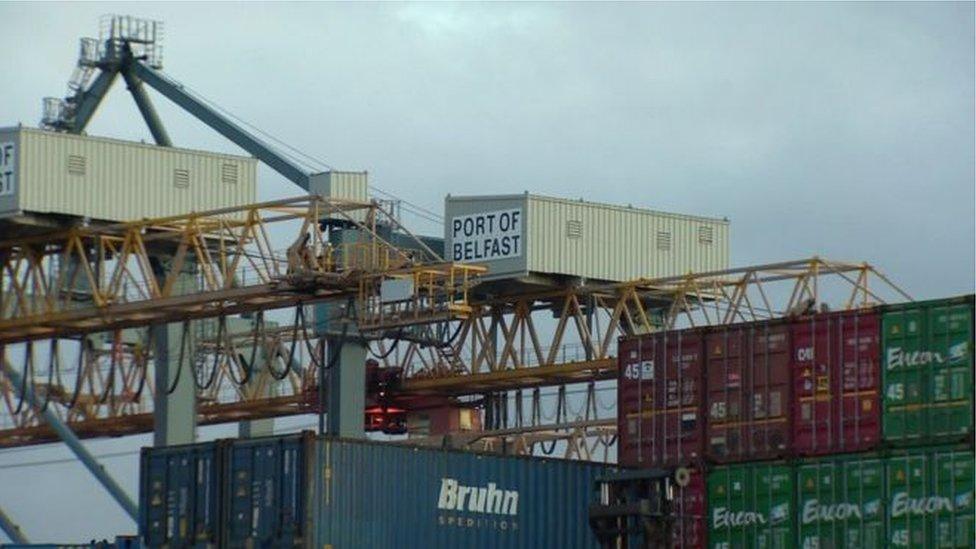
Unionists have expressed concern and anger over a "trade border" in the Irish Sea
He criticised the prime minister and said the withdrawal agreement was not just about trade, but "much more fundamental" to uphold NI's peace process.
"People need to remember in the House of Commons, that Ireland has many friends in the US.
"I want to thank Vice-President Joe Biden, the Speaker Nancy Pelosi.. for all you've said this week.
"And they've been clear. They'll be no trade deal if you do violence to this protocol."
Alliance deputy leader Stephen Farry told MPs that the majority of people in Northern Ireland "do not want the government to break international law on their behalf".
The North Down MP said a sea border down the Irish Sea made more sense than a land border between NI and the Republic of Ireland.
"We're talking about the difference between seven air and sea crossings versus 270 land crossings," he added.
Sinn Féin's Chris Hazzard, whose party does not take its seats in Westminster due to a long-standing policy of abstentionism, called on the EU and the Irish government to "stand up to maintain the withdrawal agreement and Irish Protocol, our peace agreements and our political institutions".
Earlier, Ulster Unionist leader Steve Aiken said that despite problems with the Northern Ireland Protocol, his party does not agree with the government's legislative approach.
"The United Kingdom cannot be seen to be repudiating an international treaty because where does that leave all the other international treaties, including the Belfast Agreement?" Mr Aiken told Good Morning Ulster.
Further stages of the legislation are due to be fast-tracked through the Commons over the next week.
- Published14 September 2020
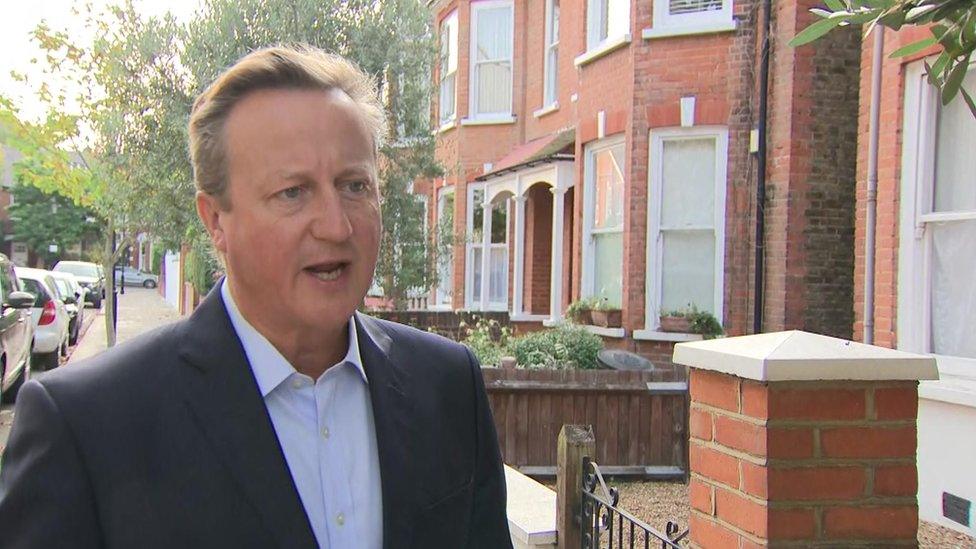
- Published2 February 2024

- Published14 September 2020
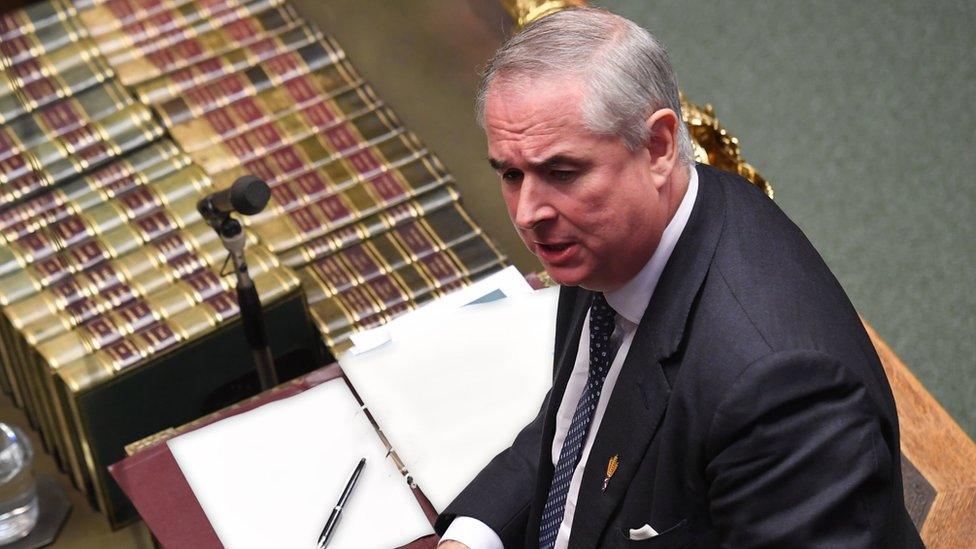
- Published8 December 2020
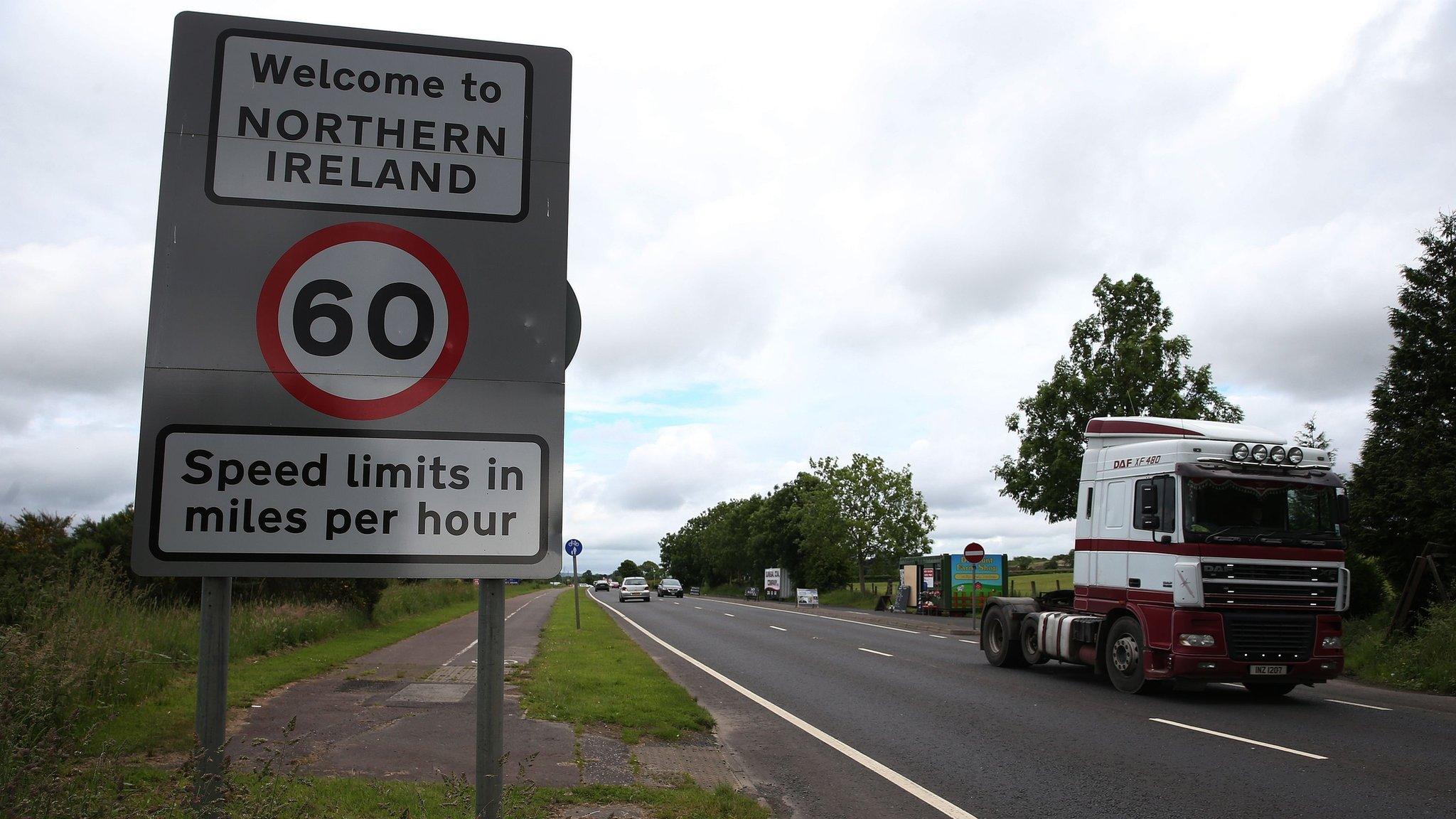
- Published10 September 2020
